

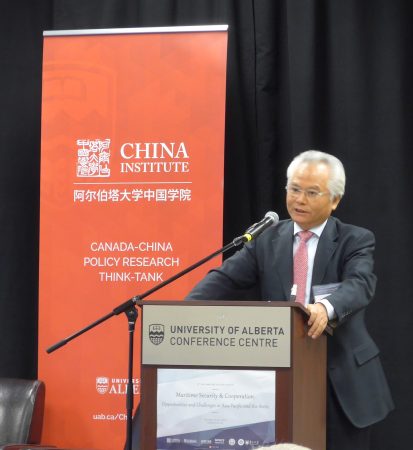
ICAS sent a delegation lead by Executive Director Dr. Nong Hong to Edmonton, Canada to attend the 5th annual Asia Maritime Security Forum, with the theme “Maritime Security and Cooperation: Opportunities and Challenges in Asia-Pacific and the Arctic.” The conference was co-hosted by ICAS, and featured introductory remarks by advisory board members Dr. Wu Shicun and Dr. Gordon Houlden. Board member Dr. Zhu Feng also chaired a panel entitled Dispute Management and Ocean Governance, of which Dr. Hong was a panelist.

Over 60 participants contributed to the Forum, including scholars from across Canada, China, the United States, the Republic of Korea, Singapore, and Taiwan region, as well as representatives from the Pogwash Group, and several other international organizations. Chinese Ambassador to Canada Lu Shaye delivered a keynotes speech, and representatives from the Chinese consulate in Calgary, as well as the Philippines consulate in Calgary were also in attendance. There was also significant representation by Senior Canadian officials from Global Affairs Canada and the Department of National Defence.
Over two days, participants presented and discussed a variety of topics that included the engagement of coastal states in regional and international organizations, the applicability of legal frameworks in the Arctic and South China Sea, economic competition and cooperation, environmental sustainability and protection, maritime boundary delimitation, dispute settlement and management, and mitigation of military and geopolitical maritime conflict. Broadly, the conference focused on the reconciliation of interests for coastal states, as well as user states in both the Arctic and the South China Sea. Participants drew parallels between the economic competition and environmental sensitivity of both regions, but also contrasted the legal and political histories of the Arctic Ocean and South China Sea, as well as relations between their respective coastal neighbors.
Thursday, October 26
Panel I: Geopolitical Situation and Security Challenges

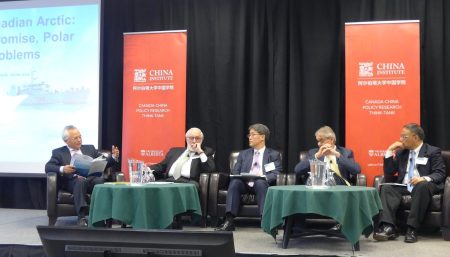
Panelists discussed the broader economic and military implications of maritime boundary disputes and resource exploitation in the Arctic and South China Sea, with particular attention paid to hegemonic competition between the United States and Russia, as well as the United States and China respectively. Several panelists suggested that President Trump’s uncertain and ambiguous policy toward Asia, combined with a somewhat assertive military presence in the South China Sea through Freedom of Navigation Operation Program (FONOP), has caused a reciprocal defensive reaction by China’s navy, which may lead to further tensions in the South China Sea. There was debate between panelists about whether or not legal fundamentalism is appropriate in a maritime context: while a more strict interpretation of the United Nations Convention on the Law of the Sea (UNCLOS), as well as third party arbitration have been successful tactics in the case of dispute settlement in the Arctic, these techniques have proven less successful in the South China Sea, due in large part to historical and political tensions. Panelists agreed that current peaceful relations in the South China Sea may open a window of opportunity to construct meaningful dialogue between East Asian neighbors.
Panel II: Security and Safety Challenges of Navigation

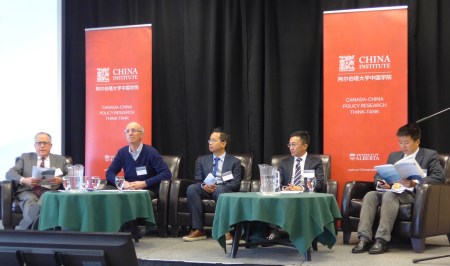
All four panelists affirmed the importance of global legal frameworks in order to effectively govern maritime spaces; however, panelists differed on the interpretation of UNCLOS as it relates to both the Arctic Ocean and the South China Sea. One panelist noted significant difference between the American and Chinese interpretation of UNCLOS, particularly with respect to Freedom of Navigation and how to carry out the delimitation of the Exclusive Economic Zones. All panelists agreed that uncertainty, as it relates to data transparency, preferences of coastal states, legal ambiguity, and resource extraction, leads to growing tensions in both the Arctic and South China Sea. To solve this problem, a panelist suggested a common database, maintained by coastal states, in order to build up an internal mechanism for collaboration and communication. Discussants explored the utility of ASEAN’s newly articulated Code of Conduct (in progress), and deliberated on the merits of binding/nonbinding legal mechanisms in the case of the South China Sea.
Panel III: Maritime Environment Protection
 In the third panel, discussants
In the third panel, discussants 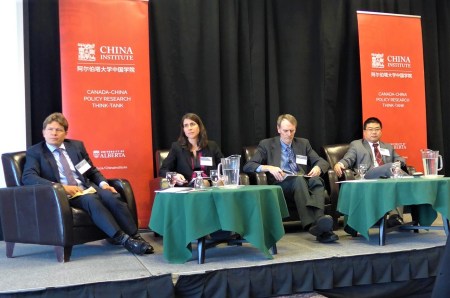 explored the ecological crises experienced in both historical and present-day marine environments. One panelist suggested that the loss of marine biodiversity is the single most important issue in the South China Sea today, but that there is no political will to protect these valuable ecosystems. A second panelist noted that historical non-compliance and scientific uncertainty in the Arctic and Antarctica has implications for the South China Sea, and suggested that weak agreements in support of whaling in the 1930s created a historical precedent of ineffectual restrictions on modern day whaling practices. Ineffectual environmental governance and enforcement has had significant ecological impacts on biodiversity and marine flora. However, a third panelist noted that the Arctic and South China Sea represent significantly different case studies, as the South China Sea has finitely divisible resources, and the costs of international fishing impact countries to varying degrees. Likewise, the harsh conditions of the Arctic force countries with divergent interests to cooperate, while the disputes in the South China Sea are between nations and people, rather than against nature.
explored the ecological crises experienced in both historical and present-day marine environments. One panelist suggested that the loss of marine biodiversity is the single most important issue in the South China Sea today, but that there is no political will to protect these valuable ecosystems. A second panelist noted that historical non-compliance and scientific uncertainty in the Arctic and Antarctica has implications for the South China Sea, and suggested that weak agreements in support of whaling in the 1930s created a historical precedent of ineffectual restrictions on modern day whaling practices. Ineffectual environmental governance and enforcement has had significant ecological impacts on biodiversity and marine flora. However, a third panelist noted that the Arctic and South China Sea represent significantly different case studies, as the South China Sea has finitely divisible resources, and the costs of international fishing impact countries to varying degrees. Likewise, the harsh conditions of the Arctic force countries with divergent interests to cooperate, while the disputes in the South China Sea are between nations and people, rather than against nature.
Panel IV: Dispute Management and Ocean Governance

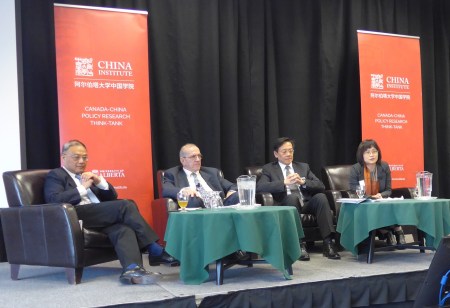
Discussants explored the similarities and differences between dispute settlement and risk mitigation in the context of the Arctic Ocean and the South China Sea: a panelist noted that Canada uses a ‘functionalist approach’ to dispute management, and avoids conflict over maritime or Arctic territory boundary disputes with its Arctic neighbors. Canada has successfully resolved several disputes with the United States, and is actively managing a dispute with Denmark. One panelist recounted how the Canadian military would leave bottles of Canadian whiskey on the disputed Hans Island, which would be replaced by the Danish military with Schnapps to denote Danish sovereignty over the island and its waters. However, several panelists noted that the peaceful resolution of Arctic disputes is due, in part, to low maritime traffic within the region. By comparison, the South China Sea has multiple overlapping claims, as well as accessible resource and shipping interests, and a high volume of traffic: over $5 trillion worth of goods is transported annually through the South China Sea. For these reason, panelists agreed that dispute settlement processes used in the Arctic are likely not applicable to the South China Sea. The panelists also explored the value of the peaceful non-settlement of disputes as one alternative. Instead of focusing on UNCLOS as a third-party mechanism, coastal states should focus on UNCLOS as a framework for future governance in the South China Sea.
Friday, October 27
Panel V Maritime Cooperation

Three of the panelists discussed 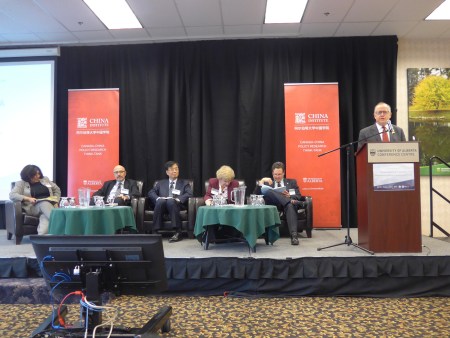 maritime cooperation and regional engagement in the Arctic, while the fourth panelist discussed scientific collaboration and fish stock data collection in the South China Sea. A panelist noted that the Arctic Council exhibits trans-boundary participation: indigenous groups collaborate across state lines, permanent members, and observer states cooperate on a variety of governance issues including scientific research, search and rescue, nuclear weapon non-proliferation, innocent passage, and natural resource protection. It was also suggested that sovereign Arctic research initiatives could be used to house foreign researchers from other Arctic coastal states, as well as scientists from near-Arctic states, such as China. It was agreed that environmental protection can be regarded as a common interest between coastal states in both regions and that scientific cooperation through projects such as a common data based monitoring system will be essential to ensure equitable catch quotas among coastal states. This is particularly true, for the South China Sea, which acts as a sink for carbon and organic pesticides. These pollutants are most dense in the South China Sea compared to other marine environments, and it is therefore essential to construct and maintain unified regional environmental management mechanisms to protect the global and regional commons.
maritime cooperation and regional engagement in the Arctic, while the fourth panelist discussed scientific collaboration and fish stock data collection in the South China Sea. A panelist noted that the Arctic Council exhibits trans-boundary participation: indigenous groups collaborate across state lines, permanent members, and observer states cooperate on a variety of governance issues including scientific research, search and rescue, nuclear weapon non-proliferation, innocent passage, and natural resource protection. It was also suggested that sovereign Arctic research initiatives could be used to house foreign researchers from other Arctic coastal states, as well as scientists from near-Arctic states, such as China. It was agreed that environmental protection can be regarded as a common interest between coastal states in both regions and that scientific cooperation through projects such as a common data based monitoring system will be essential to ensure equitable catch quotas among coastal states. This is particularly true, for the South China Sea, which acts as a sink for carbon and organic pesticides. These pollutants are most dense in the South China Sea compared to other marine environments, and it is therefore essential to construct and maintain unified regional environmental management mechanisms to protect the global and regional commons.
Summary
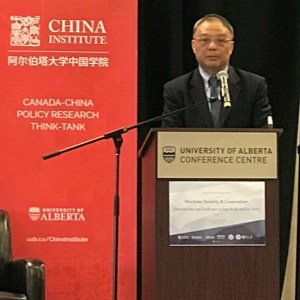
Participants across five panels discussed the political, historical, economic, and legal complexity of marine governance, using the Arctic and the South China Sea as case studies. Panelists explored environmental protection and resource governance at the nexus of economic and sovereignty interests. Participants also considered maritime legal challenges and past successes experienced in both regions. Over the course of the two day conference, three major themes emerged between panels: first, panelists considered how dynamic rivalries between neighbors can influence maritime cooperation or discord in a given environment, and how these rivalries have changed over time. Second, panelists debated the merits and costs of strict legalization of a space, or whether a flexible legal understanding can better accommodate for historical and political tensions between user and coastal countries. Finally, panelists considered how uncertainty can impact the preferences of maritime states: scientific uncertainty can impact environmental protection and political will, while present insecurity or uncertainty can cast doubt on past cooperation. Likewise, legal ambiguity can lead to divergent interpretations of international agreements. At the conclusion of the conference, discussants raised a potential future research question: how can the international community deal with intractable problems while remaining good neighbors?
Click here for more information on panel speakers and program outlines.

